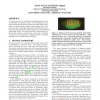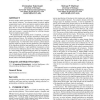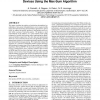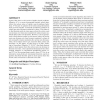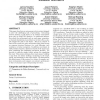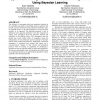ATAL
2008
Springer
15 years 2 months ago
2008
Springer
Although normative systems, or social laws, have proved to be a highly influential approach to coordination in multi-agent systems, the issue of compliance to such normative syste...
82
Voted
ATAL
2008
Springer
15 years 2 months ago
2008
Springer
A spatial computer is a distributed multi-agent system that is embedded in a geometric space. A key challenge is engineering local agent interaction rules that enable spatial comp...
82
Voted
ATAL
2008
Springer
15 years 2 months ago
2008
Springer
In many complex multi-agent domains it is impractical to compute exact analytic solutions. An alternate means of analysis applies computational tools to derive and analyze empiric...
107
Voted
ATAL
2008
Springer
15 years 2 months ago
2008
Springer
This paper considers the problem of performing decentralised coordination of low-power embedded devices (as is required within many environmental sensing and surveillance applicat...
109
Voted
ATAL
2008
Springer
15 years 2 months ago
2008
Springer
Many multiagent domains where cooperation among agents is crucial to achieving a common goal can be modeled as coalitional games. However, in many of these domains, agents are une...
117
click to vote
ATAL
2008
Springer
15 years 2 months ago
2008
Springer
The context of this work is the search for realism and believability of Virtual Humans. Our contribution to achieve this goal is to enable Virtual Humans (VH) to react to spontane...
45
Voted
ATAL
2008
Springer
15 years 2 months ago
2008
Springer
100
Voted
ATAL
2008
Springer
15 years 2 months ago
2008
Springer
This paper describes an autonomous robot system designed to solve the challenging task of geocaching. Geocaching involves locating a goal object in an outdoor environment given on...
71
Voted
ATAL
2008
Springer
15 years 2 months ago
2008
Springer
115
Voted
ATAL
2008
Springer
15 years 2 months ago
2008
Springer
Crowd simulation models are currently lacking a commonly accepted validation method. In this paper, we propose level of presence achieved by a human in a virtual environment (VE) ...

